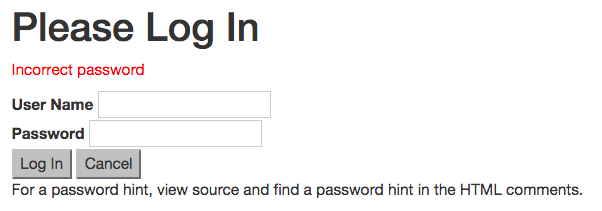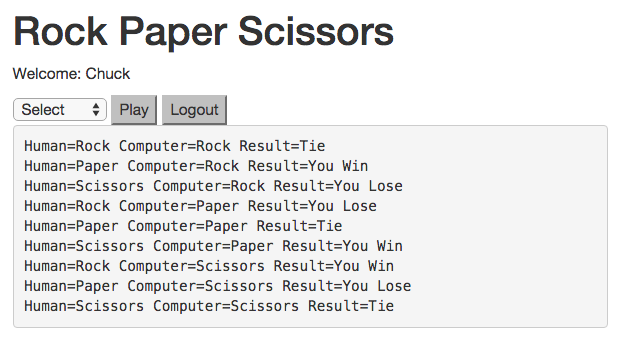Assignment: Login and Rock Paper Scissors
In this assignment we will create a three page web application to play rock, paper, scissors (http://en.wikipedia.org/wiki/Rock-paper-scissors). We will only allow logged in users to play the game.
Resources
There are several resources you might find useful:
- Recorded lectures, sample code and chapters from the textbook
www.wa4e.com
will be helpful in understanding the aspects of PHP used in this application.
- Arrays
- Functions
- Forms and POST Data
- Documentation of
how salted hashes work from Wikipedia.
- Documentation on how one web page
redirects to another in HTTP and PHP.
- Documentation from PHP on how the
header() function works.
- NGROK - A tool
to create temporary secure tunnels from a local server to the Internet
if you need to submit this to an autograder.
You can download sample code
for an incomplete/broken version of this application from:
http://www.wa4e.com/code/rps.zip
You can play with the broken sample code at:
http://www.wa4e.com/code/rps/
Sample solution
You can explore a sample solution for this problem at:
http://www.wa4e.com/solutions/rps/
Specifications
 When you first come to the application (index.php) you are told to go to a
login screen.
When you first come to the application (index.php) you are told to go to a
login screen.
Requirements for the Login Screen
 The login.php should be a login screen. It should present a field
for the person's name (name="who") and their password (name="pass").
Your form should have a button labeled "Log In" that submits the form
data using method="POST" (i.e. these should not be GET parameters).
The login.php should be a login screen. It should present a field
for the person's name (name="who") and their password (name="pass").
Your form should have a button labeled "Log In" that submits the form
data using method="POST" (i.e. these should not be GET parameters).

The login screen needs to have some error checking on its input
data. If either the name or the password field is blank, you should put
up a message of the form:
User name and password are required
If the password is non-blank and incorrect, you should put up a message
of the form:
Incorrect password
If there are errors, you should come back to the login screen (login.php)
and show the error with blank input fields (i.e. don't carry over the
values for name="who" and name="pass" fields from the previous post).
You are to use a "salted hash" for the password. The "plaintext" of the
password is not to be present in your application source code except in comments.
For this assignment, we will be using the following values for the salt
and stored hash:
$salt = 'XyZzy12*_';
$stored_hash = '1a52e17fa899cf40fb04cfc42e6352f1';
Note that the sample code is using a different salted hash so you
should change the sample code to use this hash.
The stored_hash is the MD5 of the salt concatenated with the plaintext
of php123 - which is the password. This hash is computed using the following
PHP:
$md5 = hash('md5', 'XyZzy12*_php123');
In order to check an incoming password you must concatenate the salt plus
password together and then run that through the hash() function
and compare it to the stored_hash.
If the incoming password, properly hashed matches the stored stored_hash
value, the user's browser is
redirected
to the game.php page with the user's name as a GET parameter using:
header("Location: game.php?name=".urlencode($_POST['who']));
Specifications of the Game Playing Screen
In order to protect the game from being played without the user properly
logging in, the game.php must first check the session to see
if the user's name is set and if the user's name is not set in the session
the game.php must stop immediately using the PHP die() function:
die("Name parameter missing");
To test, navigate to game.php manually without logging in - it
should fail with "Name parameter missing".
 If the user is logged in, they should be presented with a drop-down menu
showing the options Rock, Paper, Scissors, and Test as well as buttons
labeled "Play" and "Logout".
If the user is logged in, they should be presented with a drop-down menu
showing the options Rock, Paper, Scissors, and Test as well as buttons
labeled "Play" and "Logout".
If the Logout button is pressed the user should be redirected back to the
index.php page using:
header('Location: index.php');
If the user selects, Rock, Paper, or Scissors and presses "Play", the
game chooses random computer throw, and scores the game and
prints out the result of the game:
Your Play=Paper Computer Play=Paper Result=Tie
The computation as to whether the user wins, loses, or ties is to
be done in a function named check() that returns a string
telling the user what happenned:
// This function takes as its input the computer and human play
// and returns "Tie", "You Lose", "You Win" depending on play
// where "You" is the human being addressed by the computer
function check($computer, $human) {
...
return "Tie";
...
return "You Win";
...
return "You Lose";
...
}
The "Test" option requires that you write two nested for
loops that tests all combinations of possible human and computer
play combinations:
for($c=0;$c<3;$c++) {
for($h=0;$h<3;$h++) {
$r = check($c, $h);
print "Human=$names[$h] Computer=$names[$c] Result=$r\n";
}
}
The $names variable contains the strings "Rock", "Paper",
and "Scissors" in this example. The output of this should
look as follows:

This will allow you to make sure that your check() function
properly handles all combinations of the possible plays
without having to play for a long time as the computer makes
random plays.
What To Hand In
For this assignment you will hand in:
- A screen shot (with URL) of your login.php rejecting an incorrect password
- A screen shot (with URL) of your game.php correctly showing the 'Name parameter missing' error
- A screen shot (with URL) of your game.php doing a normal play with the computer making a choice other than Rock
- A screen shot (with URL) of your game.php doing a correct test run
- Source code of login.php
- Source code of game.php
Grading
Please review carefully. The most important aspect of peer-grading is useful comments about what might be wrong and need fixing. You cannot re-submit your assignment unless the instructor allows you to resubmit.
The total number of points for this assignment is 10.
You will get up to 5 points from your instructor.
You will get up to 3 points from your peers.
You will get 1 for each peer assignment you assess.
You need to grade a minimum of 2 peer assignments.
You can grade up to 5 peer assignments if you like.
Optional Challenges
This section is entirely optional and is here in case you want to
explore a bit more deeply and test your code skillz.
Here are some possible improvements:
- Instead of using a series of if-elseif-else statements in the
check() function, try to compute the win/lose aspect of the game
with a simple arithmetic computation using remainder operator ( % )
- Add some images to the output. Don't replace the required output
with images - simply add some images to make it prettier.
Provided by:
www.wa4e.com
Copyright Creative Commons Attribution 3.0 - Charles R. Severance
 The login.php should be a login screen. It should present a field
for the person's name (name="who") and their password (name="pass").
Your form should have a button labeled "Log In" that submits the form
data using method="POST" (i.e. these should not be GET parameters).
The login.php should be a login screen. It should present a field
for the person's name (name="who") and their password (name="pass").
Your form should have a button labeled "Log In" that submits the form
data using method="POST" (i.e. these should not be GET parameters).
 When you first come to the application (index.php) you are told to go to a
login screen.
When you first come to the application (index.php) you are told to go to a
login screen.


